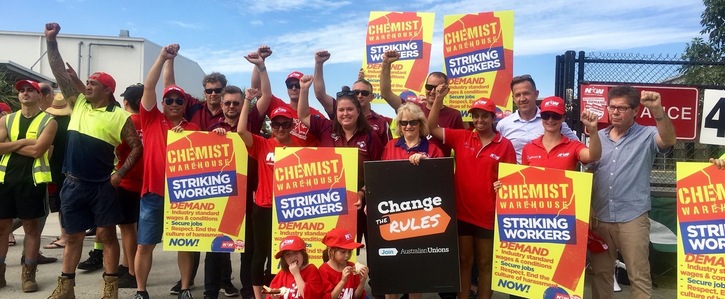Workers of Australia’s largest retail pharmacy chain, Chemist Warehouse (CHW), went on an indefinite strike on March 12, against the workplace culture of sexual abuses and labor exploitation. Around 800 workers in the company’s three major storehouses in Melbourne, Sydney and Brisbane have taken industrial action.
The strike is organized by the National Union of Workers (NUW), covering warehouses in most of the southern provinces of Australia. Chemist Warehouse is the largest retail pharmacy group that ships over 1 million retail goods every week.
The strike came in response to the company’s lax attitude in dealing with sexual harassment cases, many of which are reportedly barely investigated or left unresolved. According to the petition put up by the workers, they “are afraid to speak out for fear of losing shifts. The workplace culture is toxic, with many of us facing bullying, intimidation and sexual harassment.”
“They’ve got a well-oiled machine for dealing with any complaints from workers,” Jenna Christie, a union organizer at the Melbourne warehouses of CHW, told the Red Flag. “A lot of migrant women and labor hire [hired through labor contractors] women are terrified to speak out. They’ve seen it happen before, and they know that nothing was done about it,” she added.
The workers also raised the matter of casualization (contractualization) of labor at the retail chain’s storehouses. Hundreds of CHW workers are hired as casual workers, which requires them to work for long hours on significantly lesser wages than their regularized counterparts. In several storehouses, most of the workers are casualized and made to compete for a very limited number of regularized posts. For instance, in the CHW storehouses in the southeastern state of Victoria, over 70% of the staff are estimated to be casualized.
According to reports, roughly 140 workers have permanent jobs in the Melbourne warehouses and 20 to 400, depending on the season, are hired casually through third-party labor contractors.
Jenna further noted that, “this is some of the worst culture and treatment of workers that I’ve seen as an organizer at any sites. People are pushed hard to meet KPIs [key performance indicators] and so on.”
The NUW has presented the retail giant a charter of demands, asking the company to address, apart from the issues mentioned above, wage hike and the betterment of working conditions. Pickers at some of the storehouses are reportedly paid an average hourly wage of AUD 24.35 (USD 17.2), which is well below the industry standard that ranges between AUD 27 – 28 (USD 19 to 19.75). Moreover, casualized workers are often paid hourly wages as low AUD 20 (USD 14). Even the wages in its retail outlets have been low. For instance, an assistant pharmacist is paid as low as AUD 14 (USD 10) per hour, as compared to the AUD 19 (USD 13.4) per hour.
In November 2016, an investigation by the Fair Work Ombudsman (FWO), an independent government agency tasked with reviewing industrial relations, found that the company had underpaid around 6,000 of its employees to the tune of AUD 3.6 million (USD 2.5 million). This was despite the fact that company had a turnover of USD 1.7 billion that very year. The findings of the FWO pressured the company into signing the compliance partnership with the Ombudsman in December 2016, along with back paying its employees the money they were owed.
But this was evidently not the end of it. Over the span of next two years, the company increased labor casualization, which allows it to bypass the compliance agreement with FWO. The present strike sheds light on the continuing exploitation of workers by the CHW management.





